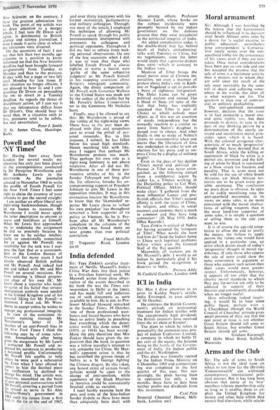India defended Sir: Taya Zinkin's cavalier treat- ment of Neville
Maxwell's India's China War does less than justice to a first-class historical work. Mr Maxwell writes from close obser- vation of the events described in his book (he was the Times cor- respondent in Delhi at the time), and has made" full and judicious use of such documents as were available to him. He is not, as Pro- fessor Michael Howard remarked in the Sunday Times, 19 October, 'one of those professional west- haters and breast-beaters who have been so active lately in preaching that everything which the demo- cratic world has done since 1945 (1939, or 1914) has been wrong'. More the pity therefore that Mrs Zinkin should have given the im- pression that the book in question was a fellow traveller's attempt to win sympathy for China. Mr Max- well's apparent crime is that he has tarnished the graven image of Nehru as a St George fighting the Chinese dragon. By this taken, any honest critic of certain Israeli policies would be open to the charge of anti-semitism, while opponents of the Black Muslims in America could be conveniently brushed aside as racialist.
I need hardly examine here the pros and cons of the Sino-Indian border dispute as these have more than adequately been dealt with by, among others, Professor Alastair Lamb, whose books on the subject incidentally were promptly banned by the Indian government on the dubious ground that they were prejudicial to the territorial integrity of India. An added complication today is the double-think that lies behind much of India's attitudinising: talks with Pakistan or China, but no negotiations, since the latter would imply that a genuine dispute does exist—which is contrary to the Indian view.
Mention of Tibet brings the usual parrot cries of Chinese im- perialism, yet even a murmur of protest about India's role in Kash- mir or Nagaland is apt to provoke a burst of righteous indignation. The Dalai Lama can be given political asylum and treated like a Head of State (in spite of the fact that India has explicitly accepted that Tibet is part of China) to which nobody must object, as if this was an assertion of sturdy independence but the cowardly reaction to a similar re- quest from Stalin's daughter is passed over in silence. And what finally is one to make of Nehru's claims to statesmanship when one learns that the liberation of Goa was undertaken in order to win an election for his party and to im- press China by a display of military might? Even in the days of her decline China's moral and political in- fluence ;n Tibet was never extin- guished, as the following extract from a confidential report by Laden La, a Tibetan working in the Darjeeling police to Col Weir, Political Officer, Sikkim, should make clear: 'I gathered from the most influential Lamas and pro- British officials that Tibet's natural affinity is with the races of China. In religion, and ethics, in social manners and customs, there is much in common and they have long connection.' (26 May 1930, India Office Records.) Taya Zinkin is critical of Nehru for having accepted the 'conquest of Tibet'. What would she have had him do? Send the Indian Army to Lhasa with logistical problems before which even the General Staff of the Raj quailed. Meanwhile all students are in Mr Maxwell's debt. I would as an Indian be particularly glad if his book gained the recognition it deserves in India.
Premen Addy 56 Canfield Gardens, London Nw6






















































 Previous page
Previous page